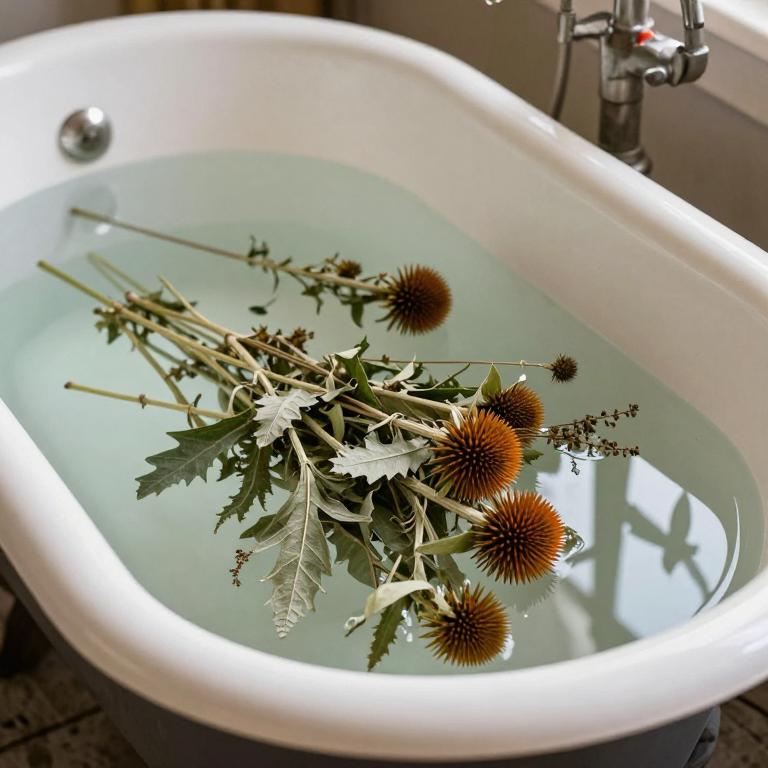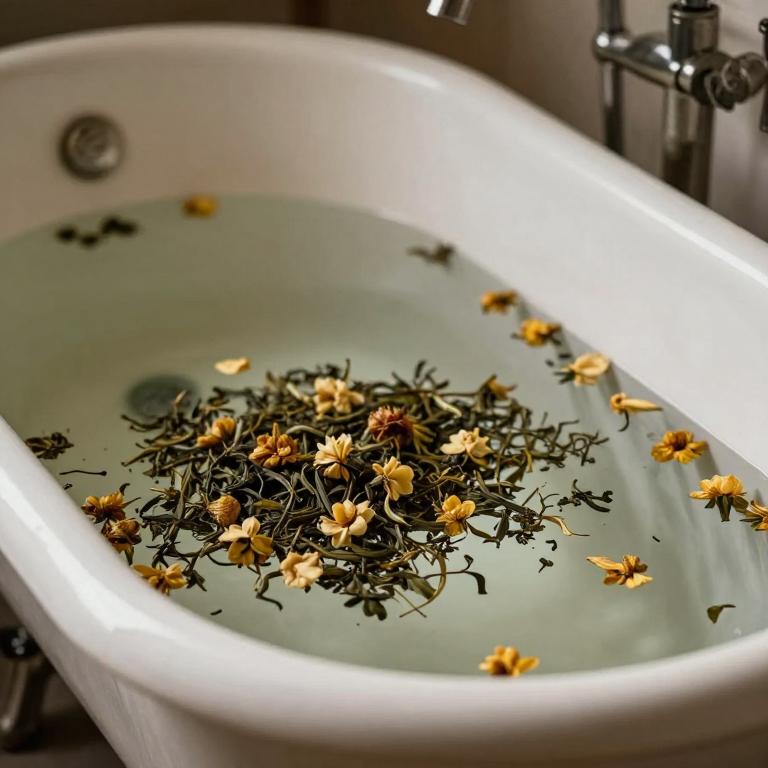10 Best Herbal Baths For Cold Sore

Herbal baths can be a soothing and natural remedy for cold sores, offering both comfort and potential therapeutic benefits.
Certain herbs such as echinacea, calendula, and lavender are commonly used in herbal baths due to their anti-inflammatory, antiviral, and calming properties. To prepare an herbal bath, these herbs can be steeped in hot water and then added to a tub, allowing the steam to help open pores and ease discomfort. The warm water helps to reduce swelling and promote healing while the essential oils in the herbs may help to ease the burning sensation associated with cold sores.
While herbal baths are not a cure for cold sores, they can be a complementary part of a holistic approach to managing symptoms and supporting the body's natural healing process.
Table of Contents
- 1. St. john's wort (Hypericum perforatum)
- 2. Yarrow (Achillea millefolium)
- 3. Echinacea (Echinacea purpurea)
- 4. Rosemary (Rosmarinus officinalis)
- 5. Salvia (Salvia officinalis)
- 6. English lavender (Lavandula angustifolia)
- 7. Stinging nettle (Urtica dioica)
- 8. Dog rose (Rosa canina)
- 9. Camellia (Camellia sinensis)
- 10. Marigold (Calendula officinalis)
1. St. john's wort (Hypericum perforatum)

Hypericum perforatum, commonly known as St. John's wort, has been traditionally used in herbal baths to alleviate symptoms associated with cold sores.
When infused into warm water, the herbal bath can help reduce inflammation and soothe the affected area, offering a natural alternative to conventional treatments. The antiviral and anti-inflammatory properties of St. John's wort may help shorten the duration of cold sores and promote faster healing. To prepare the bath, a handful of dried hypericum leaves is steeped in boiling water for about 15 minutes, then cooled to a comfortable temperature before being used for soaking.
However, it is important to consult with a healthcare provider before using this remedy, especially if you are on medication, as St. John's wort can interact with certain drugs.
2. Yarrow (Achillea millefolium)

Achillea millefolium, commonly known as yarrow, has been traditionally used for its anti-inflammatory and antiseptic properties, making it a potential natural remedy for cold sores.
When used in herbal baths, yarrow can help soothe the skin and reduce the discomfort associated with cold sore outbreaks. To prepare the bath, a few tablespoons of dried yarrow can be steeped in hot water, then allowed to cool before being used as a soaking solution. The soothing effects of the bath may help alleviate pain and promote healing by reducing inflammation and preventing secondary infections.
While yarrow baths may offer some relief, they should not replace medical treatment for severe or persistent cold sores.
3. Echinacea (Echinacea purpurea)

Echinacea purpurea, commonly known as purple coneflower, is a popular herbal remedy often used to support immune health.
While it is typically consumed as a tea or supplement, some individuals use echinacea in herbal baths to help alleviate symptoms of cold sores. The anti-inflammatory and antimicrobial properties of echinacea may help reduce the duration and severity of cold sore outbreaks. To prepare an echinacea bath, steep dried echinacea in hot water and then add the infused water to a tub of warm water.
However, it is important to consult a healthcare provider before using echinacea, especially for those with allergies or chronic conditions.
4. Rosemary (Rosmarinus officinalis)

Rosmarinus officinalis, commonly known as rosemary, is often used in herbal baths to support healing and comfort for cold sores.
The essential oils found in rosemary, such as camphor and pinene, possess antiviral and anti-inflammatory properties that may help reduce the symptoms of cold sores. Adding a few drops of diluted rosemary oil to warm bath water can provide a soothing, aromatic experience that may help ease pain and promote skin regeneration. While it is not a cure for cold sores, rosemary baths can be a complementary therapy to support the body's natural healing process.
As with any herbal remedy, it is advisable to consult with a healthcare provider before use, especially for those with sensitive skin or existing medical conditions.
5. Salvia (Salvia officinalis)

Salvia officinalis, commonly known as sage, has been traditionally used in herbal baths to help alleviate symptoms of cold sores.
When infused into bath water, sage's antimicrobial and anti-inflammatory properties may help reduce the duration and severity of cold sore outbreaks. The warm water soothes the affected area, while the essential oils in sage provide a calming effect. To prepare a sage bath, simply steep dried sage leaves in hot water for several minutes before adding it to a warm bath.
Regular use of sage herbal baths can be a natural and soothing addition to a holistic approach for managing cold sores.
6. English lavender (Lavandula angustifolia)

Lavandula angustifolia, commonly known as English lavender, has been traditionally used for its calming and healing properties, making it a popular choice for herbal baths aimed at缓解 cold sores.
When infused into bath water, lavender can help soothe the skin, reduce inflammation, and promote relaxation, which may support the body's natural healing process. The antiviral and antimicrobial properties of lavender may help in reducing the duration and severity of cold sore outbreaks. To prepare a lavender bath, simply steep dried lavender flowers in hot water for several hours, then add the infusion to a warm bath and soak for 15 to 20 minutes.
Regular use of lavender baths can provide a gentle, natural remedy that complements other treatments for cold sores.
7. Stinging nettle (Urtica dioica)

Urtica dioica, commonly known as stinging nettle, has been traditionally used in herbal baths for its potential anti-inflammatory and antiviral properties.
When infused into warm water, stinging nettle can create a soothing bath that may help reduce the discomfort associated with cold sores. The plant contains compounds like histamine and formic acid, which can initially cause a tingling sensation but are believed to have therapeutic benefits when used externally. Some proponents suggest that these baths may help speed up the healing process and alleviate symptoms such as itching and redness.
However, it is important to consult with a healthcare professional before using stinging nettle baths, especially for those with sensitive skin or existing health conditions.
8. Dog rose (Rosa canina)

Rosa canina, also known as rosehip, is a traditional herbal remedy that has been used for centuries to support skin health and immune function.
When used in herbal baths, rosehip can help soothe and nourish the skin, potentially reducing the discomfort and appearance of cold sores. The anti-inflammatory and antioxidant properties of rosehip may aid in the healing process by promoting cellular repair and reducing viral activity. To prepare a rosehip bath, steep dried rosehip fruits in hot water, strain the mixture, and add it to warm bath water.
Regular use of this herbal bath can be a gentle, natural way to support the body's natural defenses against cold sore outbreaks.
9. Camellia (Camellia sinensis)

Camellia sinensis, the plant from which green and black teas are derived, has been traditionally used for its soothing and anti-inflammatory properties.
Herbal baths infused with Camellia sinensis can provide relief for cold sores by reducing inflammation and promoting healing. The antioxidants present in this plant help to combat viral infections and support the immune system. To prepare such a bath, steep a handful of dried Camellia sinensis leaves in hot water and add the infusion to a warm bath.
While not a cure, these baths can be a calming and supportive addition to a holistic approach for managing cold sore symptoms.
10. Marigold (Calendula officinalis)

Calendula officinalis, commonly known as pot marigold, has been traditionally used for its anti-inflammatory and antiviral properties, making it a popular choice for herbal baths aimed at relieving cold sores.
When infused into warm water, calendula can help soothe the skin and reduce the discomfort associated with cold sore outbreaks. The gentle nature of calendula makes it suitable for topical application, allowing the skin to absorb its beneficial compounds without irritation. Regular use of calendula-infused baths may help shorten the duration of cold sores and promote faster healing.
However, it is advisable to consult with a healthcare provider before using herbal treatments, especially for those with sensitive skin or existing medical conditions.